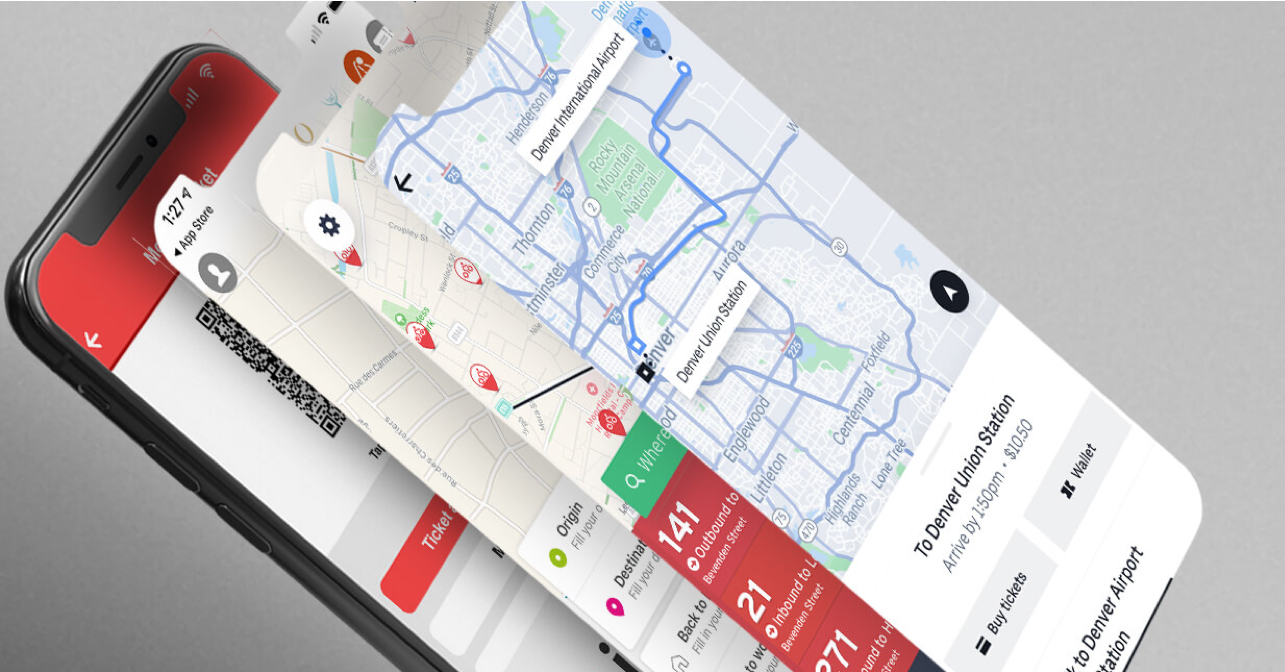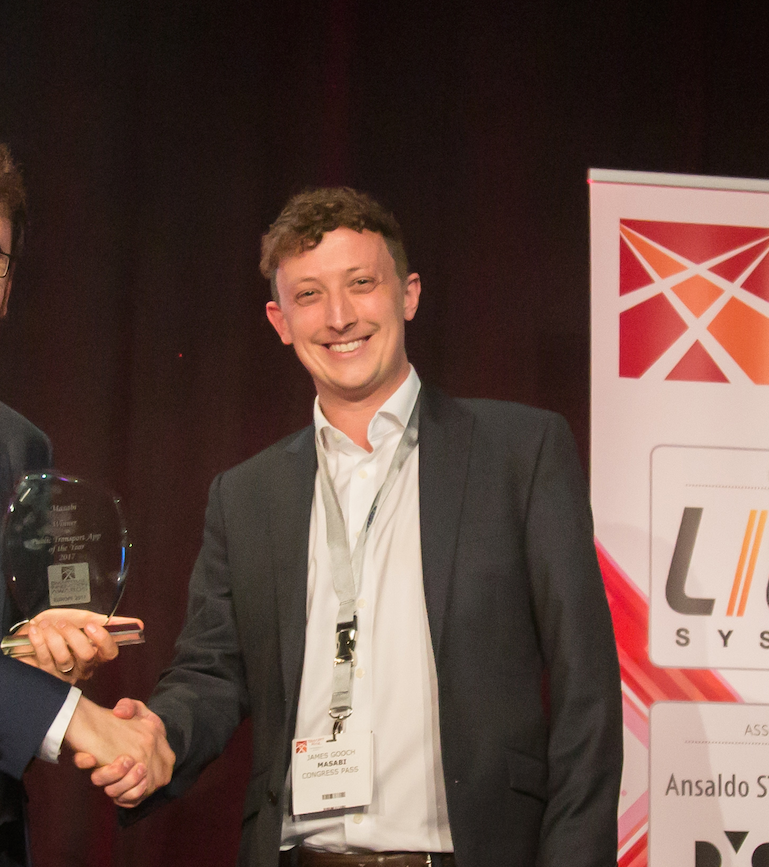Mobility as a Service (MaaS) is the integration of different modes of transport and transit tools into a mobility service accessible from the moment people leave their front door until they reach their destination, planning and paying seamlessly based on what and how much they use, without using a private car.
MaaS promises to help move people away from private car usage, helping to reduce congestion and pollution in cities around the globe. In Masabi’s view, there are currently three approaches to enabling MaaS for public transport (which are not mutually exclusive). These are:
1. Practical Mobility as a Service (MaaS)
Practical MaaS delivers public transit ticketing within consumer facing or white label MaaS apps, such as those supplied by; Transit, Uber, Moovit, Gertek and Jorudan. This model connects public transit with private mobility services and tools without the need for discounts or new business models. The benefits of this approach include:
- Cost-effective - simply the cost of retailing a mobile ticket
- Quick to deploy - the service can be live in days/weeks (with an existing Masabi SDK partner)
- Increased accessibility and discoverability of public transport - by including public transit within multiple urban mobility applications, services are easier to board and find.
2. Account-Based Mobility-as-a-Service (MaaS)
Account-Based MaaS uses an Account-Based token (mobile barcode, smartcard, mobile payment or contactless bank card) to travel via tapping (or being) on public and private vehicles. The fares are then calculated based on what and how much people consume. Passes (like a monthly subscription) are earned based on usage over particular time periods, but does not exclude people unable to afford, or not requiring, an upfront subscription. The benefits of this approach include:
- Usage-based pricing and capping - provides a socially equitable payments solution for everyone to use and access
- Demand based pricing - helps to reduce congestion, maximise mobility resources and assist with crowding
- Good examples of emerging Account-Based Mobility-as-a-Service deployment are with RTS in Rochester, NY and Dayton RTA.
3. Subscription-Based MaaS
Subscription-Based MaaS connects public and private transit options through a subscription, where users pay up front for a mobility package. The benefits of this approach include:
- Provides an alternative to private cars for corporate benefit schemes
- Good for rider groups who can afford to pay upfront
All these approaches have their pros and cons, but we believe Practical MaaS and Account-Based MaaS make the most sense for cities and agencies in order to provide social equity and facilitate demand-based pricing and better policy control levers.
70 Transit Agencies in Five Countries Have Enabled Practical Mobility as a Service (MaaS)
Practical MaaS is the integration of ticketing for public transit into third-party apps. These apps usually fall into two groups. Consumer facing MaaS apps (such as Transit, Uber, Moovit and Jorudan) or white label MaaS apps (such as those provided by companies like Kyyti and Gertek).
With Practical MaaS, there is no need for agencies to give a discount on tickets or often even pay an upfront cost. They simply pay the normal fee they would when they sell a mobile pass. The app providers may bundle up tickets, or simply retail public transit tickets - with or without other mobility services.
Practical MaaS can be enabled using Masabi's Justride SDK. In fact, the Justride SDK is the world's first mobile ticketing SDK for public transport and is proven with more than 70 agencies across five countries.
Enabling Practical Mobility as a Service - the Justride Mobile Ticketing SDK
Practical MaaS in Canada
Transit launched in-app ticketing for public transit in Canada during 2019 for riders in St Catharines, allowing them to buy tickets and ride public transport using the Transit (app), while also combining public transit with Transit’s other private mobility services. After just over 4 weeks mobile ticketing adoption using the SDK was over 7%.
Transit and Masabi also launched Montreal’s first mobile fare solution for ARTM covering all Montreal-area buses in September 2020.
Saskatoon Transit also launched mobile ticketing with Transit in 2021 alongside an agency branded mobile application.
Practical MaaS in Japan
Jorudan, Japan’s leading journey planner and MaaS application, launched ticketing for public transit for Syoei Express Bus which operate services into Tokyo City. Jorudan went on to launch Practical MaaS in Toyota City and Oita City in time for a major sporting event taking place in the country. The service then went live for JRW and Nikko Kottsu Bus service. In total, more than 30 agencies in Japan have deployed a Practical MaaS solution with Jorudan and Masabi.
Practical MaaS in the USA
The Justride SDK has been adopted by Uber to deliver ticketing for public transit for riders of RTD services in Denver. The launch of Uber Transit ticketing, which completed its roll out at the end of May 2019, saw more than 14,500 tickets sold through Uber by the end of September. RTD went on to deploy ticketing in the Transit app, meaning more people already using urban mobility applications can now easily access and discover RTD services. These new rider capabilities were launched alongside the existing agency mobile ticketing application (also provided by Masabi), which has continued to see a rise in adoption since the two SDK launches. In December 2020 tickets were also enabled in Lyft for RTD services, expanding the app retail network further and making it easy for Lyft users to discover, purchase and use RTD tickets.
A similar offering went live in Las Vegas in January 2020 with the launch of ticketing in both the Uber and Transit applications, operating alongside the existing agency branded app. Lyft also enabled mobile fares in 2021.
The next 14 agencies to deploy a branded mobile ticketing application and Practical MaaS using Transit were; Laketran (Lake County), MCPT (Medina County), METRO RTA (Summit County), PARTA (Portage County), Sandusky Transit (Erie County), SARTA (Stark County), TARTA (Lucas County), WRTA (Mahoning County), BCRTA (Butler County), SORTA (Hamilton County), TANK (Northern Kentucky), The Ride and The Lancaster-Fairfield Transit systems. The EZfare service (enabled through NEOride) went fully live in October 2019 and has since sold thousands of tickets and expanded to include the option to buy tickets in Uber and Moovit.
Ticketing in Transit has been extremely successful and has also been deployed with agencies in St Louis, Dayton, Duluth, Rochester and Pittsburgh.
From November 2020 transit riders using San Joaquin RTD, Manteca Transit, Tracer, eTrans, Altamont Corridor Express (ACE Rail), GrapeLine and City of Ripon transit services have been able to use the Vamos Mobility app to plan their journeys and, thanks to the addition of ticketing via the Justride SDK, purchase tickets for any of the seven participating transit systems. The project was made possible through SJCoG bringing together a regional practical MaaS solution with Kyyti and Masabi.
Academy Bus launched the white label SilverPass mobile app in January 20201 to make trip planning and paying easier and safer for riders during the COVID-19 pandemic and beyond with Moovit and Masabi. This followed in 2021 with a launch for Suffolk Transit.
Fire Island Ferry riders can now purchase tickets directly in the Uber app following a successful launch in 2021.
Practical MaaS in the United Kingdom
Thanks to the success of launches with RTD and RTC, Uber Boat by Thames Clippers was launched in 2020 with tickets in the Uber app powered by Masabi's mobile ticketing SDK.
Practical MaaS in Spain
The Lurraldebus app was launched in 2018 through our partner Gertek. This app deployment is the first step in the movement to MaaS for the operator and since launch has seen the service expand to more lines.
The future of public transit is a connected one
Practical MaaS is on the rise thanks to the ease of deployment and the fact that agencies of all sizes can connect into developing MaaS ecosystems without any upfront cost or needing to offer a discount on tickets. If you are interested in retailing tickets or having your tickets retailed in white label or consumer branded MaaS apps please email james.gooch@masabi.com.
Placing Public Transport at the Center of Mobility as a Service (MaaS)
This eBook provides a comprehensive guide to the three different approaches to MaaS available today and gives practical steps public transit agencies can take to move to MaaS.


